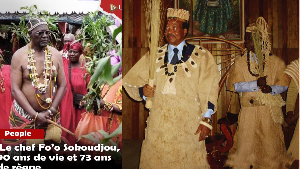On 7 June 2016, the government of Cameroon concluded with the International Finance Corporation (IFC) and the French electricity company EDF, a shareholder agreement for the purpose of creating the Nachtigal Hydro Power Company (NHPC), a company to operate the future Natchigal dam, with a capacity production of 420 MW, whose implementation is scheduled for 2021.
With control of 40% of the capital of this new company, against 30% for each of its partners in the project (State of Cameroon and IFC), EDF, the French electricity company, will thus have command of the largest hydro electric plant in Cameroon, for a period of 35 years, during which NHPC will contractually manage the dam.
Thanks to Natchigal, EDF is in the position to be, from 2021, amongst the most important Private Power Producers (PPP) in the Cameroonian electricity market. This French company is thus positioning itself alongside the consortium formed by the British CDC group, and the Norwegian fund Norfund, which has in 2015, taken over the shares of Globeleq Africa (then controlled by British investment fund Actis) in KPDC and DPDC, two companies which manage the Kribi gas plant (216 MW extendable to 330 MW) and Dibamba fuel plant (96 MW).
This Anglo-Norwegian consortium, managing a capacity of 426 MW, is the leading private producer of electricity in Cameroon, and consequently an important supplier for Eneo, the operator of the public electricity service, of which 56% (5% in the process of being handed over to staff) of shares are held, since June 2014, by British investment fund Actis.
As the concession agreement of Eneo is due to end in 2021 (this is the date when EDF begins management of the Natchigal dam), British shareholders of this electricity producing and distributing company have already started moves towards the Cameroonian authorities, in order to extend the concession contract for a further 10 years.
Extension of concession against financing
We learn from authorised sources that from the year 2015, Actis-Eneo submitted to the Cameroonian government a business plan with an associated investment plan covering 2015 until……2031. The operator pledges to invest FCfa 900 billion, against“accompanying measures” on the side of the Cameroonian state.
Indeed, our sources reveal, for the financing of this investment programme, Actis-Eneo proposes to raise equity, operating revenues and, above all a long-term loan of more than FCfa 200 billion for which the “lenders have indicated the necessity of having the length of the concession cover the period of reimbursement”, we learn.
In other words, highlights our source close to the dossier, required funding can not be raised, including an injection of funds of around FCfa 25 billion proposed by Actis ; as long as “the principle of the extension of the concession”, of Eneo, which expires in 2021, is “not agreed”.
While Actis-Eneo is going to great lengths convince the government to extend the concession, and EDF is preparing itself to manage the Natchigal plant, a second French company has come forward in the sector of electricity transmission.
Indeed, at the end of last May, the Cameroonian government threw its lot in with the expertise of RTE International, 100% owned by RTE, the operator of the French network of electricity transmission, to support the operationalisation of the national company of electricity transmission (Sonatrel) of Cameroon. It is not excluded that this 17-month technical assistance becomes permanent.
Infos Business of Monday, 18 July 2016
Source: businessincameroon.com













